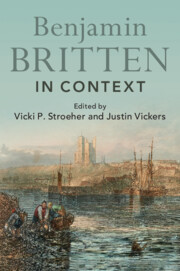Book contents
- Benjamin Britten in Context
- Composers in Context
- Benjamin Britten in Context
- Copyright page
- Dedication
- Contents
- Figures
- Tables
- Notes on Contributors
- Acknowledgements
- Bibliographic and In-Text Abbreviations
- Prologue
- Part I The Britten Circle(s)
- Part II British Musical Life
- Part III Britten and Other Composers
- Chapter 17 The Compositional Context
- Chapter 18 Responding to a British Musical Past
- Chapter 19 Britten and the English Musical Renaissance
- Chapter 20 Responding to the Continent
- Chapter 21 An English Tradition?
- Chapter 22 ‘An Exciting Time with All the Russians’
- Chapter 23 The Avant-Garde
- Part IV Wordsmiths, Designers, and Performers
- Part V British Sociocultural, Religious, and Political Life
- Further Reading
- Index
Chapter 23 - The Avant-Garde
from Part III - Britten and Other Composers
Published online by Cambridge University Press: 31 March 2022
- Benjamin Britten in Context
- Composers in Context
- Benjamin Britten in Context
- Copyright page
- Dedication
- Contents
- Figures
- Tables
- Notes on Contributors
- Acknowledgements
- Bibliographic and In-Text Abbreviations
- Prologue
- Part I The Britten Circle(s)
- Part II British Musical Life
- Part III Britten and Other Composers
- Chapter 17 The Compositional Context
- Chapter 18 Responding to a British Musical Past
- Chapter 19 Britten and the English Musical Renaissance
- Chapter 20 Responding to the Continent
- Chapter 21 An English Tradition?
- Chapter 22 ‘An Exciting Time with All the Russians’
- Chapter 23 The Avant-Garde
- Part IV Wordsmiths, Designers, and Performers
- Part V British Sociocultural, Religious, and Political Life
- Further Reading
- Index
Summary
This chapter is an examination of Britten’s engagement with progressive musical and aesthetic thought. As a successful and popular composer, Britten is rarely identified as an ‘avant-garde’ artist, yet his career took note of progressive developments from 1930s neoclassicism to 1970s minimalism. For mid-century critics, Britten was a cosmpolitan figure; more recently, his commitment to tonality argues a ‘reactive modernism’, in dialogue with tradition. Britten’s relations to avant-garde thought involve successive historical contexts. In the 1930s, he sought to study with Berg, wrote experimental film soundtracks, and explored neoclassical parody, without abandoning key tonality. In the 1940s, Britten’s music developed greater metric complexity. Britten’s 1950s catalogue increasingly explores a personal twelve-tone thematic idiom, along with non-European percussion sonorities inspired by renewed encounters with Balinese gamelan. Criticising avant-garde ‘complication’ in the 1960s, Britten tempered public scepticism with personal support for British avant-gardists.
Keywords
- Type
- Chapter
- Information
- Benjamin Britten in Context , pp. 200 - 212Publisher: Cambridge University PressPrint publication year: 2022

